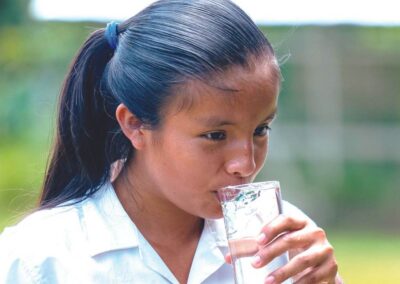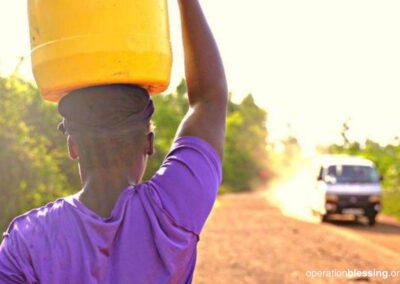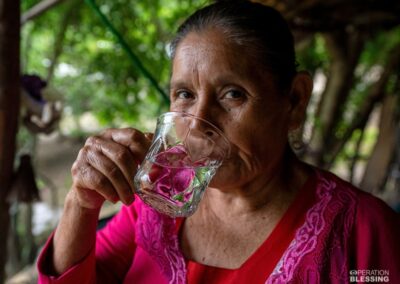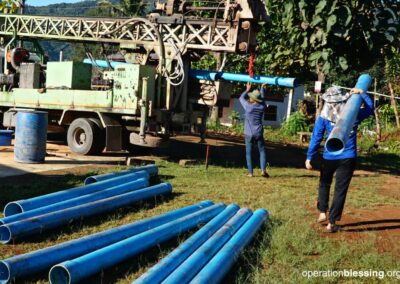Chlorination and Filtration Questions & Answers
Chlorination & Filtration Questions And Answers
Operation Blessing, an international clean water charity, has been a beacon of hope for communities in need by providing innovative water solutions. Through the use of chlorination technology, they have transformed lives by ensuring access to clean and safe water in areas affected by water scarcity, contamination, and disasters. Their efforts span across countries like Mexico, Japan, and Haiti, where they have implemented sustainable chlorination systems to combat waterborne diseases and improve public health. Below are questions and answers that highlight how Operation Blessing uses chlorination to bring clean water to those in need.
What is one of Operation Blessing’s missions?
Operation Blessing focuses on a number of missions, including providing clean and safe water to communities in need by installing sustainable community water systems.
How does Operation Blessing help communities facing water crises?
Operation Blessing focuses on a number of missions, including providing clean and safe water to communities in need by installing sustainable community water systems.
How has Operation Blessing’s work impacted Mercy's village in Kenya?
Operation Blessing installed a solar-powered community water system in Mercy’s village, providing access to clean water, reducing time spent collecting water, and eliminating the risk of waterborne illnesses like cholera and typhoid.
What role did Mercy play in her community after the water system was installed?
Mercy became a Community Health Volunteer, helping others access clean water and empowering herself to pursue small businesses.
How did Operation Blessing help the people of San José el Paraíso, Mexico?
Operation Blessing introduced rainwater harvesting systems and filtration technologies, providing the community with a sustainable source of clean water.
How did the rainwater harvesting system benefit Maria and her family in Mexico?
Maria and her family no longer had to carry water from distant sources, allowing them more time for daily chores and improving their overall health.
What was the water situation like in Baan Pa Kia Nok, Thailand?
The remote village of Baan Pa Kia Nok faced severe water shortages and contamination, forcing families to rely on boiling limited water supplies or walking to other villages for help.
How did Operation Blessing assist in Morocco after an earthquake?
After the earthquake, Operation Blessing provided portable water filtration systems to help families access safe drinking water and prevent waterborne illnesses.
What solution did Operation Blessing provide in India?
Operation Blessing installed a community water pump, giving Neelmuni and her family access to clean, safe water for drinking and daily needs.
Why is clean water essential for health?
Clean water prevents waterborne diseases such as cholera, typhoid, and dysentery, improving overall health and quality of life.
How does water scarcity affect economic opportunities in rural communities?
Water scarcity limits access to clean water for agriculture and small businesses, preventing communities from thriving economically.
How does Operation Blessing’s work contribute to breaking the cycle of poverty?
By providing clean water, Operation Blessing enables families to improve their health, education, and economic opportunities, breaking the cycle of poverty.
What types of water systems does Operation Blessing install?
Operation Blessing has installed solar-powered water systems, wells, rainwater harvesting systems, and filtration units to ensure reliable access to clean water.
How does the support of donors help Operation Blessing’s mission?
Donor contributions fund the installation of water systems, filtration technologies, and other vital resources that provide sustainable solutions to communities in need.
How can individuals support Operation Blessing’s mission?
Donor contributions fund the installation of water systems, filtration technologies, and other vital resources that provide sustainable solutions to communities in need.
Chlorination & Filtration Questions And Answers
The Global Need for Clean Water Access to safe water is a fundamental human right, yet millions of people across the world still lack reliable access to clean water. Operation Blessing, a clean water charity, has been working tirelessly to provide safe and sustainable water solutions to communities in need. Chlorination plays a crucial role in ensuring that the water people drink is free from harmful bacteria and pathogens. Below, we share individual stories from various countries where Operation Blessing has made a lasting difference.
Safe Water for Enrique’s Village – Galilea, Chiapas, Mexico (August 09, 2022)
The Challenge: Limited Access to Safe Water In the village of Galilea in Chiapas, Mexico, Enrique’s family, like many others, faced significant challenges in accessing clean water. Their homes were served by an unreliable pipe system, and the water they used was often contaminated due to ineffective treatment. The community regularly suffered from waterborne diseases like stomach pains, diarrhea, and fever.
Operation Blessing’s Intervention Operation Blessing stepped in by installing a new water system, complete with reliable pipes and a robust chlorination process to ensure the water’s safety. Additionally, the team provided hygiene workshops for 42 families, focusing on how to properly handle water and maintain cleanliness.
Impact on Enrique’s Family With the new system in place, Enrique’s family saw immediate improvements. They no longer had to worry about unsafe drinking water, and the health issues that once plagued them began to subside. The chlorination of their water significantly reduced the prevalence of illnesses caused by contaminated water, including stomach problems and fever.
Bringing Life to Dry Places – Worldwide (March 06, 2019)
The Challenge: Global Water Crises Around the world, natural disasters, climate change, and poor infrastructure contribute to water scarcity and unsafe drinking water. Communities in Puerto Rico, Zambia, India, Honduras, Guatemala, and many more have faced significant challenges accessing clean water. In these regions, the lack of clean water can lead to widespread health issues, particularly waterborne diseases.
Operation Blessing’s Water Solutions Operation Blessing has deployed a range of water solutions to combat this global crisis. From providing bottled water and filtration systems in disaster-stricken areas to setting up large-scale purification systems, the organization has used cutting-edge technologies like H2gO and SE200 chlorine generators for both small-scale and large-scale water treatment. Chlorination has been an essential part of their efforts to ensure that water is safe to drink and free of harmful pathogens.
Impact Through these interventions, Operation Blessing has provided life-saving water to thousands of individuals, including the installation of community water systems in places like Honduras and Guatemala, and the construction of wells in Zambia and India. These efforts have not only alleviated immediate water needs but have laid the foundation for long-term access to clean water in these vulnerable communities.
Refreshing Water Solution in Mexico – Jiquipilas, Chiapas, Mexico (June 18, 2024)
The Challenge: Water Scarcity and Health Issues In Jiquipilas, another town in Chiapas, Mexico, residents struggled with severe water scarcity. The community faced health problems due to unclean water, and the stress of constantly searching for safe drinking water added to their hardship.
Operation Blessing’s Intervention Operation Blessing installed a large water tank that incorporated a chlorination system, ensuring that families had regular access to clean, safe water. The team also conducted workshops on water care and hygiene, emphasizing the importance of keeping water clean and safe from contamination.
Impact on the Pérez Family and Community For Joaquín Pérez and his family, the impact was immediate and profound. Their health improved significantly, and the stress associated with water scarcity was reduced. Joaquín expressed his gratitude, saying that their way of life had already improved and would continue to get better because they now understood how to properly care for their water supply.

Blessing the Vulnerable in Japan During COVID-19 (May 01, 2020)
The Challenge: Shortage of Disinfectants During the COVID-19 pandemic, Japan faced a shortage of disinfectant supplies, especially in medical and welfare institutions. This shortage posed a major public health risk, making it difficult for healthcare workers to protect themselves and their patients from the virus.
Operation Blessing Japan’s Solution Operation Blessing Japan responded by producing Slightly Acidic Electrolyzed Water (SAEW), a chlorine-based disinfectant, and distributing it to hospitals and welfare institutions across the country. The chlorine solution was created using specialized equipment donated by Hoshizaki Corporation.
Impact A total of 2,720 liters of chlorine disinfectant were delivered to 133 institutions, benefiting over 12,000 individuals. The initiative was widely recognized and featured on NHK national news, showcasing how chlorination can play a critical role in ensuring public health during a global crisis.


Safe to Drink at Last – Haiti (February 05, 2019)
The Challenge: Waterborne Diseases in Rural Haiti In rural Haiti, communities have long struggled with limited access to safe drinking water. This lack of clean water has resulted in a high incidence of waterborne diseases like cholera, further exacerbating the country’s health challenges.
Operation Blessing’s Chlorine Solutions Operation Blessing provided long-term water solutions, including the supply of chlorine to hospitals and community programs. In partnership with local pastors, chlorine was distributed in rural areas to purify water and prevent cholera outbreaks.
Impact Through its work in Haiti, Operation Blessing has ensured that hospitals like Hospital Saint Boniface and HUEH General Hospital have access to chlorine to purify water for thousands of people. As a result, the incidence of cholera in these regions has significantly dropped, with no reported cases since the program began.

Source Articles
Water Filtration
https://www.ob.org/no-access-to-clean-water-in-peru/
https://www.ob.org/blessing-of-clean-water/
https://www.ob.org/helping-survivors-long-after-disaster-strikes/
https://www.ob.org/access-to-clean-water-in-mexico/
https://www.ob.org/clean-water-source-in-kenya/
https://www.ob.org/contaminated-well-in-peru/
Chlorination
https://www.ob.org/life-dry-places-clean-water/
https://www.ob.org/new-water-system-in-mexico/
https://www.ob.org/chlorine-blesses-vulnerable-japan/
https://www.ob.org/safe-drink-chlorine/
Join Operation Blessing in Providing Clean Water to Those in Need
By partnering with Operation Blessing, you can help us continue providing sustainable water solutions, improve health outcomes, and reduce waterborne diseases in vulnerable communities worldwide.
Join us today in the fight for clean water by making a donation or volunteering with Operation Blessing. Together, we can make a lasting difference.
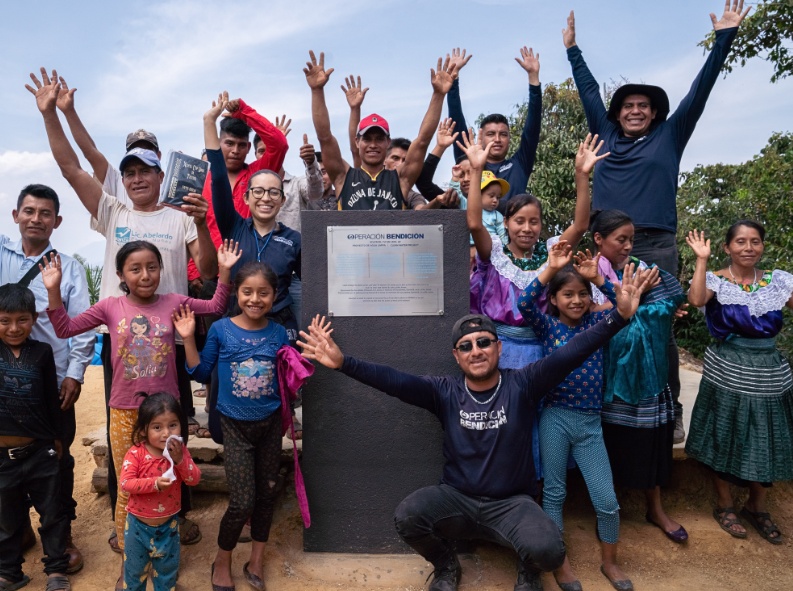
Drew Friedrich, COO

